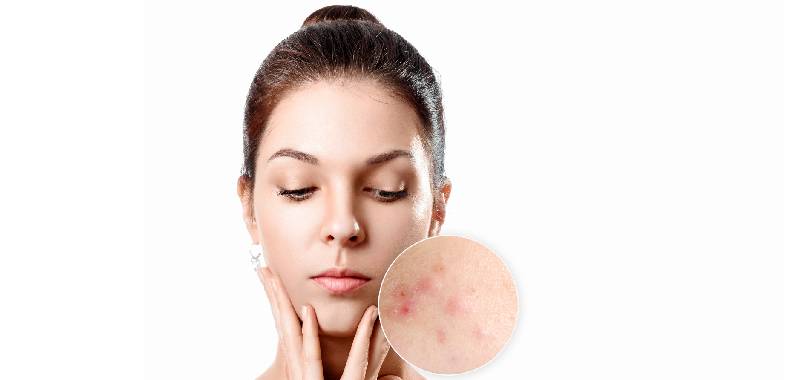Inflammatory acne is often swollen, red, and has pores that become blocked by bacteria, oil, and dead skin cells. It often appears on the face, back, chest, and shoulders. It can be painful and can even reduce your self-confidence.
If it is acne that is in the inflamed stage, it should not be left untreated and treated immediately. Read more about the causes and treatment of inflamed acne in the review below.
Causes of acne
Healthy skin sheds dead skin cells every day. Old skin cells reach the skin through the pores and disappear.
When a person is prone to acne, part of the process is accelerated, causing old cells to build up in the pores and block the opening. These collected cells mix with the skin's natural oils to form a sticky plug inside the pores.
In people with non-inflammatory acne, plugs, also known as comedones, can cause blackheads or whiteheads.
For people with acne on the face, oil and skin cells continue to accumulate until the pores are deprived of oxygen. This condition creates a home for bacteria called Propionibacterium acne–
Bacteria, oils, and skin cells can penetrate the pores beneath the skin. The immune system responds by fighting the bacteria, causing inflammation. This inflammation can cause skin symptoms, including:
- Red marks
- swell
- Irritation
- painful.
- vehicle.
- Acne scars.
These symptoms may include red or swollen pimples, lumps, or cysts.
Read more: Skincare advice for acne-prone skin, safe to use every day
Characteristics of inflammatory acne
Acne can take many forms. People with acne may have one of the following types of acne:
- There is blood clot.– These red bumps do not have a white spot in the center and vary in size.
- Pustule– The bumps are similar to papules but have a white or yellow pus-filled center and the surrounding skin is red.
- Knot– A swollen, painful lump deep in the skin does not rot in the center.
- bag– Like lumps, cysts form deep in the skin and do not have a white center, but tend to be redder than lumps.
Cysts also feel soft and are often painful to the touch. They may appear sore or sore. Inflammatory acne can sometimes be difficult to distinguish from non-inflammatory acne, especially mild acne. People with inflammatory acne may have the following symptoms:
- Acne that is red, swollen, or painful
- Pimples with white or yellow pus in the center surrounded by redness.
- Hard, painful pimples under the skin
- Pitted scars on the skin due to previous acne inflammation
Read more: An effective way to get rid of acne scars
How to treat acne
Inflammatory acne has a tendency to spread and often causes scarring, so it's important to get treatment right away. Depending on the type of acne you have, your dermatologist may recommend starting you on an over-the-counter (OTC) medication before moving on to a more aggressive prescription treatment.
It is best to consult your doctor about all of the following acne treatment options:
1. Retinoids
Retinoids are derivatives of vitamin A that are effective at removing dead skin cells. Although there are many over-the-counter anti-aging products available, prescription retinoids are most effective for treating inflammatory acne.
In addition to the initial redness and peeling, retinoids can also make the skin more sensitive to UV rays, so be sure to wear sunscreen when using retinoids.
2. Antibiotics
If a dermatologist suspects bacteria Propionibacterium acne It can cause acne. He may prescribe oral antibiotics. These are used temporarily to control bacteria. They are usually used in cases of cystic acne that has spread widely.
Unlike oral antibiotics, which can only be taken for a short period of time, topical antibiotics can be used twice daily for up to two months. However, they are not as strong as oral antibiotics, so they are most effective for mild, inflamed acne, such as nodules, bumps, or pustules.
3. Zinc
Zinc supplements can also help treat acne. The most commonly tested type is: Zinc gluconate and Zinc sulfate–
It is important not to use or consume more zinc than your doctor recommends, as too much can cause nausea and other side effects.
Read more: An effective acne medication that clears up stubborn acne.
4. Salicylic acid
Salicylic acid is an exfoliant and can remove dead skin cells from pores. This medication can also help break down acne lesions and prevent them from coming back.
You can use salicylic acid all over your skin, but be sure to follow up with a moisturizer, as it can cause dryness over time.
5. Tea tree oil
Tea tree oil is another proven remedy with antimicrobial and anti-inflammatory properties. This type of oil can be applied topically to reduce inflammation in mild to moderate acne cases.
6. Bakuchiol
Bakuchiol can be used to treat acne. This has been proven by Several studies have looked at the effects of bakuchiol on acne and acne scarring. A small 2021 study found that using a 0.5% bakuchiol cream twice daily for 12 weeks reduced the amount of acne that was left on the skin.
Bakuchiol may also help improve post-inflammatory acne scarring, which are dark spots that appear after acne breakouts.
So let's review the causes, characteristics, and treatment methods of inflammatory acne. If you have stubborn acne or acne that is difficult to treat at home, you should see a doctor to get the right treatment for your skin condition.
Chat With Farmaku's partner doctors here Consultation on skin health problems includes: Acne-prone skin and how to deal with it
















